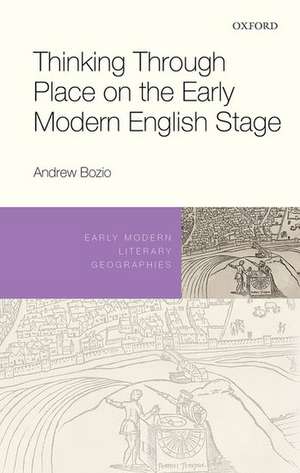Thinking Through Place on the Early Modern English Stage: Early Modern Literary Geographies
Autor Andrew Bozioen Limba Engleză Hardback – 6 feb 2020
Preț: 520.76 lei
Preț vechi: 696.50 lei
-25% Nou
Puncte Express: 781
Preț estimativ în valută:
99.64€ • 104.32$ • 82.45£
99.64€ • 104.32$ • 82.45£
Carte tipărită la comandă
Livrare economică 25-31 martie
Preluare comenzi: 021 569.72.76
Specificații
ISBN-13: 9780198846567
ISBN-10: 0198846568
Pagini: 226
Dimensiuni: 145 x 223 x 22 mm
Greutate: 0.43 kg
Editura: OUP OXFORD
Colecția OUP Oxford
Seria Early Modern Literary Geographies
Locul publicării:Oxford, United Kingdom
ISBN-10: 0198846568
Pagini: 226
Dimensiuni: 145 x 223 x 22 mm
Greutate: 0.43 kg
Editura: OUP OXFORD
Colecția OUP Oxford
Seria Early Modern Literary Geographies
Locul publicării:Oxford, United Kingdom
Recenzii
Thinking Through Place on the Early Modern English Stage is an ambitious rethinking of the ways in which playwrights, players, and audiences collaborated to imagine places into being.
Thinking through Place returns to the hexed ground of the theater of memory, astutely distinguishing theater from memory theater as mobile to static, changeable to durable. Recognizing both the long tradition of analysis of theatrical place and its own distinctness within it, Thinking through Place reweaves pioneering and foundational work by Frances Yates, Mary Carruthers, Lina Bolzoni, John Gillies, and Richard Helgerson on mental and global geographies in terms of particular institutions of performance and how through them various kinds of places are opened imaginatively by players to viewers ... Thinking through Place concentrates on how the place of the playhouse constructed other places, but it ends with a powerful observation that seems to promise a new world to explore
Admirable for its clarity despite its often complex content, Thinking Through Place provides some useful new vocabulary and a fresh approach to the application of theories of place to early modern drama ... The number and variety of plays Bozio uses to make his argument speak to the interpretive potential of applying his concept of ecological thinking to the early modern dramatic canon.
In this deeply thoughtful and layered book, Andrew Bozio argues that early modern drama reveals important insights into the complex human process of turning natural spaces into meaningful sites of place-thought and -being... impressive intellectual work of this illuminating book makes me want to read Bozio's thoughts about co-evolved embodiment and emplacement in his future research.
... worth studying for its innovative and well-grounded ideas.
In Thinking through Place on the Early Modern English Stage, Andrew Bozio offers fresh readings of some of the most interesting plays of Shakespeare's contemporaries and provides a compelling account of how "thinking unfolds through and as an ecology on the earlymodern English stage" (183).
Thinking through Place returns to the hexed ground of the theater of memory, astutely distinguishing theater from memory theater as mobile to static, changeable to durable. Recognizing both the long tradition of analysis of theatrical place and its own distinctness within it, Thinking through Place reweaves pioneering and foundational work by Frances Yates, Mary Carruthers, Lina Bolzoni, John Gillies, and Richard Helgerson on mental and global geographies in terms of particular institutions of performance and how through them various kinds of places are opened imaginatively by players to viewers ... Thinking through Place concentrates on how the place of the playhouse constructed other places, but it ends with a powerful observation that seems to promise a new world to explore
Admirable for its clarity despite its often complex content, Thinking Through Place provides some useful new vocabulary and a fresh approach to the application of theories of place to early modern drama ... The number and variety of plays Bozio uses to make his argument speak to the interpretive potential of applying his concept of ecological thinking to the early modern dramatic canon.
In this deeply thoughtful and layered book, Andrew Bozio argues that early modern drama reveals important insights into the complex human process of turning natural spaces into meaningful sites of place-thought and -being... impressive intellectual work of this illuminating book makes me want to read Bozio's thoughts about co-evolved embodiment and emplacement in his future research.
... worth studying for its innovative and well-grounded ideas.
In Thinking through Place on the Early Modern English Stage, Andrew Bozio offers fresh readings of some of the most interesting plays of Shakespeare's contemporaries and provides a compelling account of how "thinking unfolds through and as an ecology on the earlymodern English stage" (183).
Notă biografică
Andrew Bozio is Assistant Professor of English at Skidmore College, where he teaches courses on early modern English drama and literary theory.









